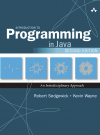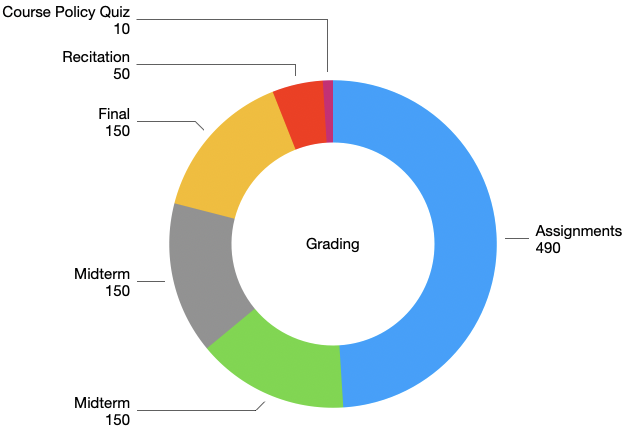Syllabus – Spring 2025

Welcome to Introduction to Computer Science, CS111. In this course you will be introduced to fundamental concepts in programming. After completing the course the student will be able to:
- Design algorithmic solutions to problems.
- Develop, implement, test, and document program code.
- Analyze program code for correctness, efficiency, equivalency, and errors.
- Demonstrate an understanding of object-oriented methodology in program development.
- Select appropriate data types/structures for use in a given application.
- Design and modify data structures capable of insertion, deletion, search, copy, and other related tasks.
- Demonstrate an understanding of searching and sorting algorithms.
We use pseudocode and the Java programming language for all assignments and exams in the course, but many Java features, such as applets, GUI programming, Java Server Pages (JSP), etc., are not covered.

CS111 meets SAS goals QQ or QR, ITR:
- Formulate, evaluate, and communicate conclusions and inferences from quantitative information. [QQ]
- Apply effective and efficient mathematical or other formal processes to reason and to solve problems. [QR]
- Employ current technologies to access and evaluate information, to conduct research, and to communicate findings, and understand the principles that underlie information systems.[ITR]
Book Resources

Required textbook Introduction to Programming in Java: An Interdisciplinary Approach, 2nd Edition, Robert Sedgewick and Kevin Wayne, Princeton University
Academic Integrity
You are responsible for reading and understanding the DCS Academic Integrity Policy. Read the overview as well as the specific policies for exams. Instances of cheating will be punished by a zero grade, a failing grade for the course, and/or referral to your dean, at the discretion of the course staff. All assignments and exams are individual but we encourage collaboration with course staff and classmates. However, you must be careful how you collaborate. Use the guidelines bellow for reference:| Course staff | Classmates | Other people | AI Chatbots | |
|---|---|---|---|---|
| Discuss concepts with: | Yes | Yes | Yes | No |
| Acknowledge collaboration with: | Yes | Yes | Yes | Yes |
| Expose code/solutions to: | Yes | No | No | No |
| Copy code/solutions from: | No | No | No | No |
Rutgers CS Diversity and Inclusion Statement
Lectures
Attendance is expected and participation is very welcomed. Everyone benefits when you attend lecture and ask questions. Note that some examples might not be in the lecture slides. If you miss a lecture, you are responsible for getting class notes from a classmate.
Recitations
Recitations are the shorter of the listed periods on your class schedule listed as CS111. i.e. the only CS111 class meeting time that is NOT 1 hr 20 min. The recitation period is problem-solving oriented and is led by a Learning Assistant (LA), an undergraduate student that has taken CS111 previously and has been pedagogically trained.
You will find recitation problems under Canvas Modules. We will release recitation problems a week ahead of the week’s recitation along with the pre recitation quiz. The problem’s solutions are released the Monday after the week’s recitation.
Each recitation is 5 points: 3 points for attendance (arrive within 10 minutes of scheduled time), 1 point (completion based) for the Canvas online pre-quiz and, 1 point (correctness based) for the Canvas online post-quiz.
The three weeks with the lowest recitation grades will be dropped, and no other absences/exceptions will be granted (other than extenuating circumstances verified by Dean of Students). This policy covers weekly absences due to illness, commute, weather, etc., so save it for when you truly need it.
- We will release recitation problems a week ahead of the week’s recitation along with the pre-recitation quiz.
- The week’s pre-quiz is available until Sunday 11PM preceding the recitation.
- The week’s post-quiz is available until Sunday 11PM following the recitation.
- You will only receive the quiz points if you attend the recitation section you are registered for and complete the quiz.
Attend the recitation for the section that you are registered. You will not receive points if you attend a different recitation than the one you are registered for.
Assignments
Assignments involve programming and written work. The due dates are strictly followed by the course staff. All assignments are due at 11:00PM, no exceptions.
Written assignments are to be submitted via Gradescope, and programming assignments via AutoLab. No assignments will be accepted via e-mail.
Always make a copy of your assignment. Remember that technical problems happen and that due dates are enforced.
Gradescope: when your first written assignment is released you will receive an email from Gradescope with login information.
Autolab: when your first programming assignment is released you will be able to login into AutoLab using your Rutgers credentials.
Written Assignments
Plan to submit your assignments on time to Gradescope, no late assignments are accepted.
Programming Assignments
Assignments involve programming in Java. The due dates are strictly followed by the course staff. All assignments are due at 11:00PM. Always make a copy of your assignment. Remember that technical problems happen and that due dates are enforced.
Assignments are graded automatically by AutoLab. Your program must compile without errors on Autolab – otherwise you will not receive any credit for the assignment. For each problem, your code will be tested using a suite of test cases, and you will receive credit for each case on which your code performs correctly. AutoLab will not display a score but it will give you feedback on your submitted program, which you can then update and submit again for grading. Always read the feedback!
You have 3 submissions without deductions; 5% of the problem total points are deducted for every submission thereafter. Autolab uses the last submission for the assignment grade.
Autolab. When your first programming assignment is released you will be able to login into AutoLab using your Rutgers credentials.
Plan to submit your work with at least one day in advance.
- Depending on the load AutoLab MAY TAKE UP TO 1 day to give you feedback.
- Note that if the system is busy it may take some time before it gets to your submission request. If the deadline passes while you are waiting, your assignment will not be accepted. In other words, if you try to hand in your work close to the end of the deadline, you may be too late.
AutoLab uses Java 17 to compile and run assignment’s test cases. After each submission the feedback includes a written text and a light:
- red means that either your program didn’t compile or it passed very few of our test cases (0 – 20% of points);
- yellow means that your program passed some test cases (21 – 80% of points);
- green means that your program passed most of our test cases (81 – 100% of points).
Programming assignments have a built-in extension of 3 days. The extension works are follows:
- if you submit up to 24 hours after the deadline a 5% penalty applies.
- if you submit after 24 hours but before 48 hours after the deadline a 10% penalty applies.
- if you submit after 48 hours but before 72 hours after the deadline a 15% penalty applies.
Academic Integrity Violations.
Autolab uses JPlag to detect plagiarism. DO NOT include any identifying information on the files you submit to Autolab (e.g. name, netid, RUID, email).
- See Academic Integrity section above.
- DO NOT share or post your assignment before the assignment 3-day extension due date.
- You MAY NOT use generative AI software (such as ChatGPT or GitHub Copilot) to create or debug programming assignment code.
Our policy for Academic Integrity Violations are:
- Student receives 0 (zero) on the assignment.
- The violation is reported. The consequences of reporting are (a) a record on your file of this violation, (b) suspension, (c) or expulsion.
Grading
Assignments are automatically graded by Autolab, you will see your score the following day after the built-in extension due date. Exams and written assignments are graded by a group of graders in Gradescope and you will receive your score one week after the assignment due date or exam date.
Regrades
You have one week after exam grades, recitation quizzes, and written assignments are released to ask for a regrade. Only ask for a regrade if you think there was a grading error, do not request a regrade simply because you think you deserve more partial credit. Submitting a regrade request.
All programming assignments are autograded, make sure you read the Hints for each submission and correct your code accordingly before your next submission. Programming assignments are not regraded unless there is a problem on the autograder. A regrade of a programming assignment would involve running the same autograder code that Autolab runs, and that would not affect your grade. If your program does not perform correctly on a particular test case, you will not receive points for that test case. For all programming assignments you have one week after the grades are released to contest your grade. The grades are released the next day after the assignment is due.
Canvas
Canvas is a course management tool that will be used to keep students scores and send out announcements. Once registered to the course you will be automatically added to Canvas. Use your Rutgers credentials to login.
The course staff expects all students to read the announcements.
Piazza
This term we will be using Piazza for class discussion. The system is highly catered to getting you help fast and efficiently from classmates, the LAs, and instructors. Rather than emailing questions to the teaching staff, we encourage you to post your questions on Piazza. If you have any problems or feedback for the developers, email team@piazza.com.
How to: Find our class page at Canvas’s left menu under Piazza.
DO NOT post any assignment solution or partial solution on Piazza. Those posts will be promptly deleted.
Exams
There will be 3 in person exams, 2 midterms and 1 final. The common hour exams are scheduled so that students from every section take the exams at the same time.
- Each exam is 150 points.
- Exams are in person. You are required to be on campus to take the exams, DO NOT make travel arrangements for those days.
- You cannot consult the textbook, notes, and assignments during exams.
- You will have 80 consecutive minutes to complete a midterm exam and 3 consecutive hours to complete the final.
- Refer to the Exams page for exam dates.
Academic Integrity Violations. One warning will be given if proctors suspect academic dishonesty from a student during an exam, and further issues will result in exams being taken and reviewed. If necessary, a report to Academic Integrity will be made and a grade of 0 given.
Conflict exams. Given documentation we provide a conflict for in person exams. The exam will be in person within 3-days of the exam. Conflict exams are strictly for university conflicts.
Accommodations. Students that require accommodations, such as extra time, must contact ODS at least two weeks before the quiz date. Email your accommodations letter to the course coordinator.
Grading
Your grade is computed out of 1000 points. The donut chart to the right has the distribution of the 1000 points among assignments, recitation attendance, quizzes and exams.
Each recitation is 5 points (3 attendance, 1 pre quiz, 1 post quiz). You have to attend at least 10 recitations and take the respective quizzes for the full 50 points. Quiz points are dependent upon recitation attendance (if you don’t attend a recitation it is 0 (zero) points even if you take the quizzes). Canvas will retain the highest 10 scores (up to 50 points) and drop the remaining lowest scores.
To compute your grade sum up all the assignments, exams, and recitations points (up to 10 recitations).
There is no curve. You must earn a minimum of 900 of the available points for an A, 850 for a B+, 800 for a B, 750 for a C+, 700 for a C, and 600 for a D. You will fail the course if you earn less than 600 points.
The cutoffs are strictly followed for each letter grade. A computed grade of 749.99 is a C not a C+.
Extra credit Surveys. For the purpose of improving the course, there are two surveys that you will be asked to fill out, an entry survey at the beginning of the semester and an exit survey at the end of the semester. The surveys are extra credit and each is worth 2.5 points.
The surveys will be sent in a Canvas announcement.


